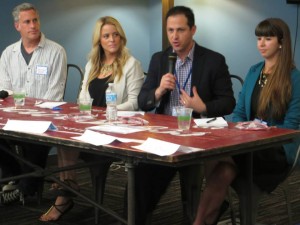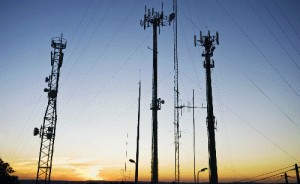Life’s a Beach, Until the Signal Dies | A Dispatch From the Other Silicon
Did you know that Los Angeles was ranked as the second best startup city in the U.S. by the Startup Genome’s Startup Ecosystem world report? Did you even know there was such a thing as the Startup Genome’s Startup Ecosystem world report?
Well, it was and there is, which goes to show that while Silicon Valley (ranked #1) gets most of the press, LA is no slouch when it comes to tech. Case in point: Silicon Beach Fest, founded by networking organization Digital LA, recently tractor-beamed thousands of attendees to Santa Monica for four days of panels, startup showcases and networking parties.
 While the name of the event is a nod to the valley some three hundred miles north, Silicon Beach Fest is decidedly LA in style and attendance. No khakis, button downs and blue blazers. It’s jeans, well-worn tees and flip flops. It’s also the perfect place to take the pulse of the city’s vibrant tech community and to learn about the issues they face and the concerns they have.
While the name of the event is a nod to the valley some three hundred miles north, Silicon Beach Fest is decidedly LA in style and attendance. No khakis, button downs and blue blazers. It’s jeans, well-worn tees and flip flops. It’s also the perfect place to take the pulse of the city’s vibrant tech community and to learn about the issues they face and the concerns they have.
Some of the hot topics at this year’s Fest included: keeping engineering talent in LA, the future of wearable tech, and the slow death of television (a subject on which Andy Sternberg of marketing agency Adler Integrated particularly focused). As I made the rounds during the event, I was constantly reminded of something that people always talk about but can’t actually see.
 Like most cities, Los Angeles faces a critical demand for spectrum (the invisible airwaves that fuel the mobile data surge from smartphones, tablets and other mobile devices), and currently demand is nearly outpacing supply. Spectrum supply is redlining, and once this growing demand outstrips supply… well, you don’t have to be an econ major to see where things are headed. Slowed mobile Internet connections. Delayed video downloads. Dropped calls. Late delivery of text messages.
Like most cities, Los Angeles faces a critical demand for spectrum (the invisible airwaves that fuel the mobile data surge from smartphones, tablets and other mobile devices), and currently demand is nearly outpacing supply. Spectrum supply is redlining, and once this growing demand outstrips supply… well, you don’t have to be an econ major to see where things are headed. Slowed mobile Internet connections. Delayed video downloads. Dropped calls. Late delivery of text messages.
While solving the need for more spectrum ultimately rests on the shoulders of the FCC (which controls the allocation of airwaves), LA’s thriving tech community — and similar communities across the country — will find itself on the front lines if spectrum supply maxes out. By happenstance, social networking company, At the Pool, had just launched its new app before this year’s Fest, and the excitement of founder Alex Capecelatro was infectious. Mobile broadband, and the hundreds of apps and startups it has launched in Silicon Beach, is helping make LA’s tech scene a key driver in the state’s economy.
All the more reason to make sure the party continues. Even a minor slowdown in freeing up additional spectrum for consumer use will be undoubtedly felt by local startups and app makers, much like a geological hiccup along the San Andreas Fault.
There’s some good news, though. Steps are being taken to make sure we don’t interrupt the mobile revolution. The FCC is preparing to auction off some TV broadcaster spectrum with the goal of freeing up more airwaves for mobile providers. As long as the FCC adopts auction rules that allow all bidders to compete equally for all of the spectrum they need to deploy advanced mobile broadband for consumers quickly, the mobile broadband boom won’t go bust.
As the thousands of attendees at this year’s Silicon Beach Fest made clear, LA’s tech community is vibrant and growing. Let’s keep it that way.








